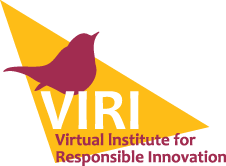VIRI News
-
March 12, 2014 |
Manchester Policy Blogs: Science and Technology
The emerging concept of responsible innovation is already taking hold in science policy and governance, writes Jonny Hankins. He argues for a multi-faced approach that emphasizes reflexivity, involves public engagement from the outset and brings on board social scientists.
-
March 7, 2014 |
ASU News
David Guston, director of the Center for Nanotechnology in Society at ASU, is the founding editor-in-chief of the Journal of Responsible Innovation, which brings together the responsible innovation scholarly community.
-
February 26, 2014 |
ASU News
Visualization scenarios, the product of a unique collaboration between ASU's Center for Nanotechnology in Society and The Design School, offer a new way to envision how a city's future might play out. The collaboration explores what scenarios might mean for environmental, economic and social sustainability.
-
February 20, 2014 |
ASU News
CNS-ASU Director David Guston led an international symposium on “Responsible Innovation in a Global Context” at the American Association for the Advancement of Science (AAAS) 2014 conference in Chicago on Feb. 15. The symposium anticipates the launch of the new Journal of Responsible Innovation (JRI) later this month.
-
February 14, 2014 |
Slate
Brundage breaks down exactly how OmniCorp, the fictional robotics company in the new RoboCop, fails to follow 5 basic robotics ethical principles. He concludes that while RoboCop may not impress movie critics, it does demonstrate "the sort of future we should try to avoid" and the need for ethics in AI technology development.
-
February 7, 2014 |
Presidential Commission for the Study of Bioethical Issues
How does including an ethicist on a research team affect scientific research, and does it generate productive collaboration among scholars? Erik Fisher, associate director for integration with the Center for Nanotechnology in Society and principal investigator for the SocioTechnical Integration Research (STIR) project, will address these and other responsible innovation questions when he testifies before the Presidential Commission for the Study of Bioethical Issues in Washington on Tuesday, February 11, 9:15 - 10:45 a.m. (EST). He will be a panel participant in the "Implementation Strategies for Ethics Integration" session, which will include a roundtable discussion. For links to view an agenda and a live webcast of the meeting, visit bioethics.gov/meetings
To learn more about STIR and Erik Fisher's research, visit http://cns.asu.edu/research/stir.
-
February 5, 2014 | Slate.com
For Better and Worse: Future Tense Blogger Miles Brundage Looks at Both Sides of Technology's Influence on Work
Slate.com contributor Miles Brundage has published a new Future Tense blog reviewing two recent publications that he concludes focus too heavily on "how technology will affect the quantity of work, rather than the quality." Brundage questions whether the technology-enhanced workplace is "a future you should be looking forward to, if you're lucky enough to have a job in the future at all" and goes on to address work experience quality concerns, including the robotization of human workers, worsened working conditions, and the elimination of human wisdom and experience in workplace interactions.
-
February 5, 2014 |
ProGReSS
The international consortium ProGReSS has published a series of interviews with Responsible Research and Innovation leaders on the YouTube channel ProgressRRI. The consortium aims to develop a governance model for RRI based on constitutional values and will eventually publish 11 interviews on the channel. In one interview, Petra Ahrweiler, director of the European Academy of Technology and Innovation Assessment in Germany, explains that "science, technology and innovation change society rapidly, opening up new courses of action and new opportunities to explore. But they also introduce new risks, so it's very important to study and assess the consequences and impacts of scientific and technological advances and to provide policy advice for decision makers." Along with Ahrweiler, other RRI experts share their views on what RRI means, its historical trajectory, and its likely future development across cultures and continents.
-
December 23, 2013 |
Slate
Future Tense blogger Miles Brundage asserts that the 10-year-old Battlestar Galactica forced us to question what we want to get out of the technologies we're creating, a question arguably more pressing today.
-
October 28, 2013 |
Innovation Excellence
The following extract is taken from an interview between Jonny Hankins and Erik Fisher in which he raises questions regarding the work of VIRI and its relevance to members of the Innovation Excellence community.
- ‹ previous
- 5 of 7
- next ›





